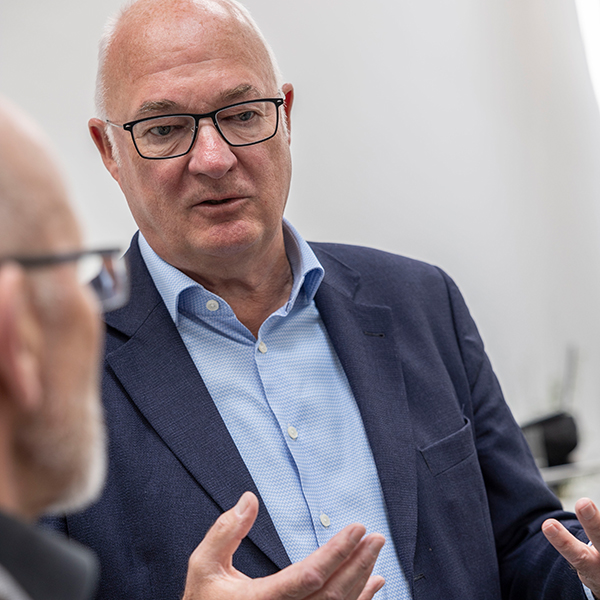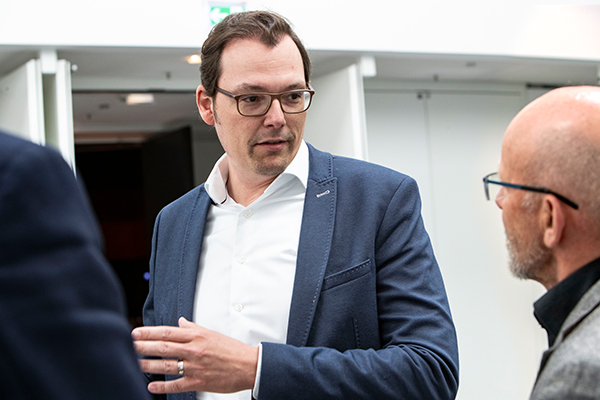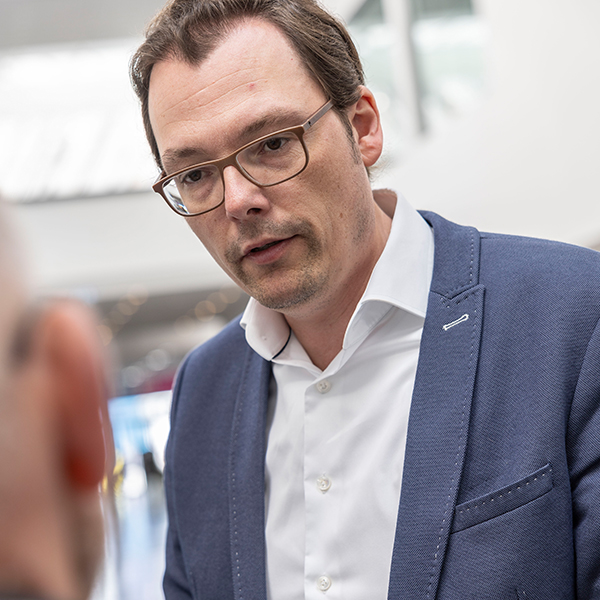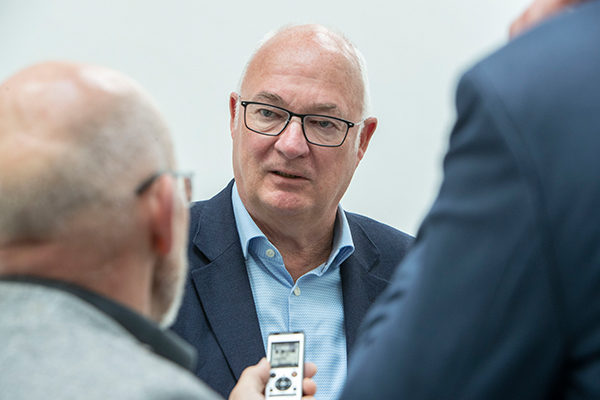
|
Generational change with a view to software-driven businessAn Interview with Bernd Pätzold and Philipp Hasenäcker Generational change at PROSTEP AG: Together with Karsten Theis, BHC's managing director Philipp Hasenäcker will be assuming responsibility for some of the tasks performed by long-time CEO, Dr. Bernd Pätzold, who will be retiring in the middle of the year. In this interview, the new and outgoing members of the executive board discuss the challenges that the company is facing and what it will take to master them. 
Question: Mr. Pätzold, you'll be retiring on 31 July 2023. Have you all done your homework? Pätzold: That's what we're busy doing. There's a list of tasks I'm working my way through together with my two colleagues on the board, Karsten Theis and Philipp Hasenäcker. We're taking a systematic approach because the portfolios that the two will be responsible for in the future will be structured somewhat differently. From the first of August, Karsten, in his role as chairman of the executive board, will assume responsibility for tasks involving the shareholders, in addition to his responsibilities for customers and products. 
Question: What exactly will the new allocation of roles look like? Pätzold: The new allocation of roles will basically be the same as it is now. Two years ago, we moved away from a function-oriented structure to a model in which each member of the executive board has operational responsibility vis-à-vis our customers, in addition to their responsibility for several key functions. This is the approach we'll be taking when we reallocate the responsibilities. Question: Mr. Hasenäcker, you'll be assuming responsibility for managing the consulting business, among other things? Hasenäcker: That's right. It's an area for which I've been responsible for the past 17 years as part of my work for BHC, and it's an area in which I have quite a bit of experience. The consulting business is very important to PROSTEP, and we've therefore been systematically stepping up our collaboration over the past six months and longer. This means that the transition will be smooth and I'll be able to get off to a flying start. Question: Will PROSTEP take some getting used to? Hasenäcker: My answer to that is a clear "no" (laughs). I've known PROSTEP for years, and ever since it acquired a majority stake in BHC in 2019, our collaboration, which is based on mutual trust, has intensified on a wide variety of levels. Communication has, of course, increased since my appointment to the executive board and it has a different quality. But I feel very comfortable with that, and not only my colleagues on the executive board but also the rest of the PROSTEP team will be providing me with excellent support. 
Question: But you won't be spending all your time in Darmstadt? Hasenäcker: No, we deliberately decided in favor of a more decentralized approach because it's important to me that I'm wherever our customers and our teams are. PROSTEP does, after all, have a number of different branches offices. And I'm also still the managing director of BHC, which has its office in Böblingen, Germany. Question: Mr. Pätzold, what goals have you set for Mr. Hasenäcker? Pätzold: It is, of course, not me who sets the goals but our customers and the supervisory board. But PROSTEP, like its customers, is in a transformation process, moving in the direction of software in the product and application lifecycle management (ALM) as a result of products evolving into mechatronic systems or connected systems of systems. Software is a crucial core competence as far as our customers are concerned, which means that we also need to move in this direction – both in terms of methods and processes as well as in terms of solutions. With our subsidiary BHC, we now have a team of 60 consultants who are highly qualified in this field. The idea is that Philipp will help us master this transformation process more quickly and provide our customers with the appropriate support. Question: Does this also mean that you intend to expand the team of software specialists at PROSTEP? Hasenäcker: Yes. That's definitely part of the plan. On the one hand, you can view the topic of software-driven business from a consulting perspective, a field in which BHC is already very well positioned, or, on the other hand, from the perspective of actual software implementation. PROSTEP already has experienced software teams in Darmstadt, Hamburg, Böblingen, Wolfsburg, Berlin and Wroclaw (Poland). But if we want to offer our customers end-to-end software solutions – i.e. from the initial concept to specification through to implementation and maintenance – on a larger scale, we need even more qualified experts who understand exactly what this involves. Question: What do these new developments mean for PROSTEP's product and solution business? Pätzold: We are dealing with several parallel trends here. On the one hand, the range of requirements is changing not only in the context of integration and migration but also in the context of customized solutions. Having migrated in the direction of BOM systems in recent years, we are now gradually moving in the direction of ALM because customers see a greater need for integration there. On the other hand, when it comes to architecture, we are seeing a clear trend towards cloud-oriented solutions. This in turn gives rise to a requirement regarding the ability to manage integrations across multiple cloud systems. At the same time, not only additional challenges in terms of security are emerging, especially when open source components are being used, but also new requirements in the context of billing for services provided. As far as we are concerned, openness definitely poses the greatest challenge. It's crucial that vendors continue to actively support this openness. Question: What impact will this have on the share of turnover between the consulting and the solution business? Hasenäcker: It would be a bit premature to talk in terms of concrete numbers. We definitely want to expand both and in particular integrate the consulting business more tightly within the PROSTEP Group. I'm not in a position to predict what kind of shift in the share of turnover there will be in the medium term. However, what I can say for sure is that the ALM business is enjoying strong growth. In recent months, we've invested heavily in a new partnership model with PTC, among others, which we hope will generate additional business. We also want to establish this model with other ALM and PLM vendors because it's often a strong network of partners that opens the doors to major customers and helps make it possible for us to add our consulting and process expertise to the mix. 
Question: Where do you see the biggest challenges in the context of PROSTEP and the customer environment? Hasenäcker: One major challenge PROSTEP is facing is most certainly the issue of personnel. We need to find the right employees, but the labor market is highly competitive. A key task will therefore be ensuring that PROSTEP remains an attractive employer over the long term. The issue of generational change, which Bernd mentioned earlier, is certainly another challenge and, of course, adapting PROSTEP's strategy to the new form of consulting. When it comes to customer environment, the biggest challenge I see is the fact that the automotive market is changing dramatically as a result of e-mobility and the large number of new players that are emerging. This may mean that the PROSTEP Group's automotive business will, in the long term, no longer be the same as it once was. Question: What about the international markets, where PROSTEP doesn't yet maintain a strong presence – with the exception of the USA? Hasenäcker: Our internationalization roadmap is not yet in place. We are, however, aware that our current focus is too narrow. We must – and we will – put our business on a more international footing. Although we already have a subsidiary in the USA, PROSTEP Inc., it doesn't yet offer the full range of services that the PROSTEP Group provides. Because we want to change that, we made a joint appearance at a major trade show in the USA just a few weeks ago with the aim of providing initial impetus for our future activities in the US market. Question: Mr. Pätzold, what advice would you like to give Mr. Hasenäcker? Pätzold: We had two key selection criteria for the new member of the board, namely the right height and the right shoe size. He has both ... 
Question: So he'll be able to fill your shoes? Pätzold: Yes, but all joking aside, Philipp understands our business and has the right attitude, and I think he's a bit of a pied piper but in a positive sense. He approaches people with great ease and enjoys working with them. That's why I think he's perfect for the job. He also has the tact required to serve as a representative of PROSTEP's role as an open and neutral mediator, even when encountering resistance. I wish him every success in this endeavor. Gentlemen, thank you very much for this interview.
About the people being interviewed Dr. Bernd Pätzold has been CEO of ProSTEP Produktdatentechnologie GmbH, which became PROSTEP AG in 2002, since 1998. Born in 1958 in Ulm, Germany, he earned a degree in industrial engineering at the Karlsruhe Institute of Technology (KIT). After completing his doctorate, he first job was at Daimler AG, where he played a major role in the founding of the prostep ivip Association and establishing the first research and development site in Silicon Valley. Pätzold will be retiring at the end of July 2023. Philipp Hasenäcker (born 1980) is managing director of PROSTEP's subsidiary BHC GmbH, which specializes in ALM/PLM consulting for mechatronic and software-driven products. He was appointed to the executive board of PROSTEP AG, effective 1 May 2023. Hasenäcker was born in Osnabrück and grew up in Paderborn. Prior to launching his career as a freelance consultant in a PLM project at Mercedes-Benz, he studied industrial engineering at the Ostwestfalen-Lippe University of Applied Sciences and Arts. |
|
| © PROSTEP AG | ALL RIGHTS RESERVED | IMPRINT | PRIVACY STATEMENT | YOU CAN UNSUBSCRIBE TO THE NEWSLETTER HERE. |
